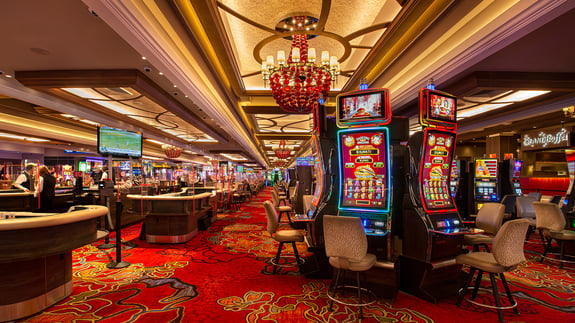
Casino games have long captivated players from all parts of society, enticing them into vibrant casinos filled with the sounds of spinning wheels, clattering chips, and cheering crowds. The thrill of chance and the allure of potential winnings create an exhilarating atmosphere that keeps gamblers coming for more. đá gà trực tiếp Whether it is the thrill of a slot machine, the strategic play of poker, or the anticipation of a roulette wheel, casino games offer a distinct combination of entertainment and risk that can be hard to ignore.
At the heart of this fascination lies a psychological pull that varies from person to person. For a few, the excitement of hitting a jackpot can elevate their mood, while for many, it’s a social experience that brings friends together. The colorful visuals, engaging sounds, and sometimes lavish environments of casinos greatly improve the appeal, making each visit an experience waiting to unfold. As we delve into why gamblers are drawn to these games, we uncover the underlying motivations and emotions that fuel their passion for the betting tables.
The Psychology of Gambling
The allure of casino games commonly stems from the complex psychology of gambling as a whole. Many individuals are drawn to the excitement of risking money for the chance of winning more, as it taps into a deep-seated human desire for excitement and reward. This excitement can create a profound emotional experience. The combination of risk and potential monetary gain can activate a dopamine surge, making players feel exhilarated.
Additionally, the design of casino games is engineered to keep players involved. The use of luminous lights, enticing sounds, and the communal environment of casinos can amplify the excitement. Players frequently find themselves engulfed in these settings, where the anticipation of a win draws them back repeatedly. This sensory overload encourages prolonged play, as the rapid feedback from wins, however minor, reinforces the desire to continue gambling.
Finally, cognitive biases play a major role in gambling behavior. Many players fall prey to the belief in control, believing they have power over outcomes even in games of luck. This attitude can lead to overoptimism and the propensity to keep playing, despite mounting losses. Additionally, gamblers often recall their wins better than their losses, which can alter their understanding and fuel the desire to gamble more. This complex interplay between emotions and cognitive factors helps illustrate why so many are drawn to casino games.
A Allure of Gaming Environments
The environment of a casino is exceptionally enthralling, luring in gamblers with its combination of anticipation and eagerness. The visuals and auditory experiences of twirling slot machines, enthusiastic gamblers, and the rhythmic jingling of tokens create an absorbing experience that is hard to resist. The lively lights and dynamic layout foster a atmosphere of energy that keeps players engaged and motivates them to remain more time. This infectious environment contributes to the overall appeal of gambling experiences, enticing both inexperienced and seasoned gamblers alike.
Furthermore, gambling venues are engineered to stimulate the senses in a fashion that makes players feel as though they are setting out on a exciting adventure. The purposeful placement of games, comfortable seating, and on-the-house refreshments enhance the overall attraction, making players feel valued and spoiled. Many casinos also include artistic furnishings and intricate themes that take visitors to various dimensions, amplifying the buzz. Such settings foster a sense of escapism, allowing gamblers to forget their everyday routines and plunge into the thrilling domain of chance.
In conclusion, the presence of fellow participants amplifies the social aspect of gaming, creating a joint excitement. Interactions among participants, either through friendly chitchat or mutual joy during a significant success, cultivate a notion of bonding that many find tempting. This interpersonal connectivity enhances the adventure of playing gaming activities, transforming it from a solitary activity into a joint journey. The combination of thrill, captivating environments, and communal connections makes casinos an irresistible place for players seeking fun and a opportunity to gain.
Understanding Casino Mechanics
Casino games are designed with specific mechanics that attract players. Every game has its unique set of rules, betting structures, and probability ratios, allowing players to engage with the game on various levels. The thrill of placing a bet and the anticipation of the outcome creates an electric atmosphere. Grasping these mechanics can deepen a player’s appreciation for the game and elevate their overall experience.
An additional crucial aspect of game mechanics is the idea of randomness. Many casino games, especially video slots and table games, rely on RNGs or shuffling to determine outcomes. This randomness is what keeps players returning; the unpredictable nature of the game creates a sense of possibility and excitement. Knowing that each play or deal is independent of the last enhances to the appeal, as players believe they have a chance at winning, regardless of past outcomes.
In conclusion, the emotional response connected with game mechanics should not be overlooked. The excitement of a major payout or the tension during pivotal moments are fundamental to the enjoyment of casino games. Such emotional highs and lows leverage psychological triggers that keep players engaged for longer periods. Comprehending these emotional responses to game mechanics can help explain why players are drawn to the thrill of casino games, constantly seeking that upcoming exhilarating moment.
